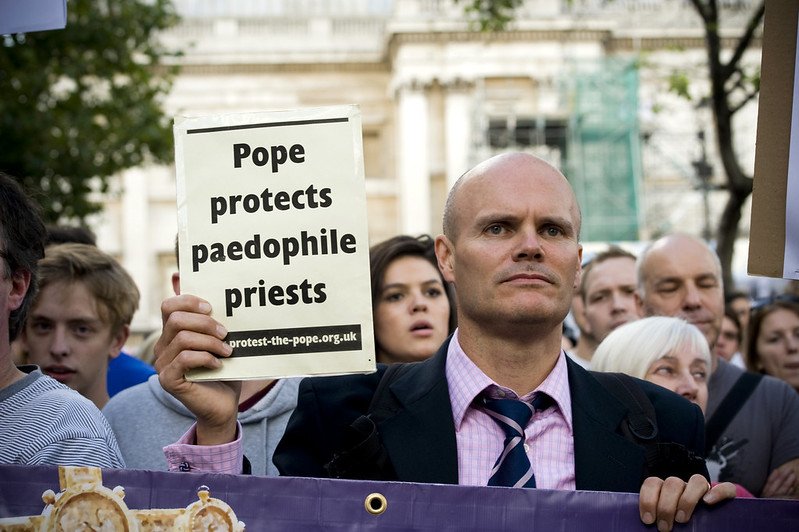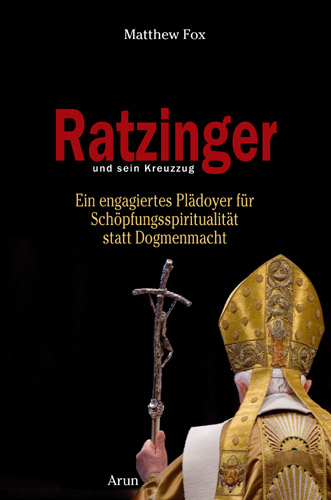January 28, 2022
Feast of Saint Thomas Aquinas
Dear Cardinal Ratzinger,
You have been in the news lately, and it has not been good news either for you or for the many victims who have been reminded of the suffering they are dealing with at the hands of the church over the past decades.
I write this letter because I am concerned about you as you face your last years and some unpleasant truths are coming out about your protecting pedophile priests who wrecked great harm on innocent children while you were archbishop in Munich. And about your lying to a commission about having been at an important meeting when a priest who ended up accosting 23 boys was discussed.
You may remember me, as I was one of the 108 theologians that you denounced in your time as head of the Congregation for the Doctrine of the Faith (formerly known as the Office of the Holy Inquisition). My name is Matthew Fox and you saw to it that I was expelled from my Dominican Order after 34 years of trying, however imperfectly, to live its lofty motto, “Truth.”
Since my expulsion I have been received into the Episcopal Church which has allowed me to continue my vocation as a theologian and to celebrate now over 110 “Cosmic Masses” by which we have brought post-modern art forms including rave, dj, vj, rap, and of course dance, to our tired liturgies of the West. For this I am grateful to them and to you also for expelling me and thus putting me on a more liberated and creative path to continue my theological and priestly vocation especially with the young.
I am pleased to learn that you have apologized publicly for not telling the truth regarding the grave matter of priestly pedophilia in your diocese of Munich. This offers hope that before your life ends you might apologize to many whom you have offended in your powerful positions at CDF and as pope. A time of confession and release seems close at hand for you and I seek to bless you on your journey.
I think it would be wise to apologize to the church as a whole for your spreading fear of theologians—and therefore of thinking—upon the household of the church. Condemning thinkers or theologians is one reason the church is so wobbly at this time and so many people have left it, especially young people who find the hypocrisy unbearable and who grew up with the news of clerical abuse of children their own ages that was rampant. Just one example is that of Cardinal Law in Boston here in the United States who, not unlike you, approved of sending a priest who abused 150 boys from parish to parish and even diocese to diocese and whom you rewarded or ‘elevated’ to be overseer of the 4th century basilica of Maria Maggiore in Rome and thus escaped testimony under oath in the courts of Massachusetts. (I pounded my 95 theses for reforming the church at that basilica for that very reason; just as I pounded them at Wittenberg at the season of Pentecost the year you became pope.)
There is also the horrible case of Father Maciel that you knew about for years and let languish on your desk at CDF who abused many seminarians in his Order and who, as it turned out, was also married twice on the side and sexually abused his own children and was a drug addict. And about whom you refused to act for years, saying that he “does so much good for the church,” meaning I guess, that he raised more money from the uber wealthy than anyone else in the twentieth century church.
But the forgiveness you seek is not only for pedophile clergy but the reason behind it which is: Ecclesiolatry. There is such a thing as making an idol of the church itself. This is done every time a member of the hierarchy chooses to put the “reputation of the church” ahead of the rights of a human being, especially a child. See what havoc is wrecked when one follows such idolatries. The irony is that the church you sought to protect at all costs is wounded far more deeply by this deception than had the truth been allowed to flourish and real action had been enacted.
It is good to see you are apologizing in your advanced age. I invite you to seek forgiveness for the following actions as well:
Calling Thich Naht Hanh, a true saint in our times, the “anti-Christ.” He passed the very week news of you broke. I knew him and his holy work well and he was indeed “another Christ” and “another Buddha” as we are all called to be—and which he taught.
Forbidding Catholics to practice yoga because it may put them “too much in touch with their bodies.”
Telling women they cannot be ordained because Jesus did not ordain women, knowing full well that he did not ordain men either and that the priesthood was a second century, not a first century, creation.
Condemning homosexuals viscously in two papal documents and refusing apparently to study any science (a la Galileo times) about the truth that 8-10 % of any human population is gay and that 364 other species have been identified that house homosexual populations.
Canonizing the Spanish fascist priest and founder of Opus Dei, Josemaria Escriva and rushing his canonization process through in record time while forbidding those who knew him very well from voicing their objections and witness to his very dubious character including his misogyny, control compulsions and heated vitriol against women who worked for him.
Promoting Opus Dei to an elevated status.
Appointing numerous Opus Dei hierarchy in South and North America including of course the current head of the United States bishops conference.
Killing liberation theology and base communities in South and Central America and in the process being complicit with “at least 10,000 murders there” as a priest very familiar with the South American scene told me.
Rushing through the canonization of JPII, your mentor and enabler, who was very much complicit in many of these actions named above.
Becoming a lightning rod for authoritarian and fascist figures including but not limited to Cardinal Burke, Stephen Bannon, and many bishops whom you appointed in the United States and beyond.
Putting obedience before truth and justice and compassion, thus contradicting the teachings of Jesus.
Rendering theology “dead” in Europe as a theologian at my alma mater, the Institut catholique in Paris put it to me.
Being a bully in your hierarchical positions.
Calling Creation Spirituality, which has been my life’s work and has inspired many especially those trying to save Mother Earth, “dangerous and deviant.” It is hard not to see such language as being a projection from you. Beware of projection and the scapegoats it makes. I would think someone who came of age under the Nazis would be especially sensitive to that practice, so common among fascists. I am at peace to let history determine whether CS or the truths emerging now about your acts of commission and omission have been, in your words, “dangerous and deviant.”
You embarrass yourself in many of these instances—surely in calling Thich Naht Hanh “anti-Christ.” And your condemning of my work such as “calling God Mother” (which Hildegard, Mechtild, Eckhart, and Julian all did); calling God “child” (ever heard of Christmas?); being a “feminist theologian” (Jesus supported women—why don’t you?—St. Hildegard was a feminist); “working too closely with Native Americans”-- what does that even mean? Native Americans have graced me with their wisdom and their profound ceremonies that honor Mother Earth and our bodily condition. They do not pray in their heads. I hope you can lift yourself of these embarrassments with a heart-felt apologies before you leave this earth.
Some people have proposed that a proper penance for your public sins would be to cease wearing the papal white outfit that you wear. I think that would be a beginning but maybe an ancient church practice might follow on that: the wearing of sackcloth and ashes (not all the time but for photographs). I think that would be humble but modest penance for the damage that has been done to many and especially the young boys who have been traumatized for life. The ashes could be simple: what one wears on Ash Wednesday.
I had a Dominican professor in my training who used to say that “a kitten born in an oven is not a cookie.” He was emphasizing the essence of a thing by his statement. The public is now aware that your white robes did not tell the story of your actions and thoughts inside you. But the revelations now made public reinforce the message that it is our insides that need cleansing, as Jesus taught.
So I pray for you and your soul in these final days of your life on earth, Joseph Ratzinger, pope emeritus. I hope that you can continue on the path you have started out on to apologize for your faulty decisions over the years. It is a good path, None of us is perfect. It is never too late to seek penance and forgiveness and time is running out for you and for the many you have offended to hear from you. I hope you will consider my proposals in the decisions you are currently making.
Your brother,
Matthew Fox, oops (once of the order of preachers).
P.S. Thank you for canonizing Hildegard of Bingen and making her a doctor of the church. I was blessed to teach two courses on the internet this past year on Hildegard and we had over 1200 students learning about her in the two classes. I am sure this pleases you as it does me.


